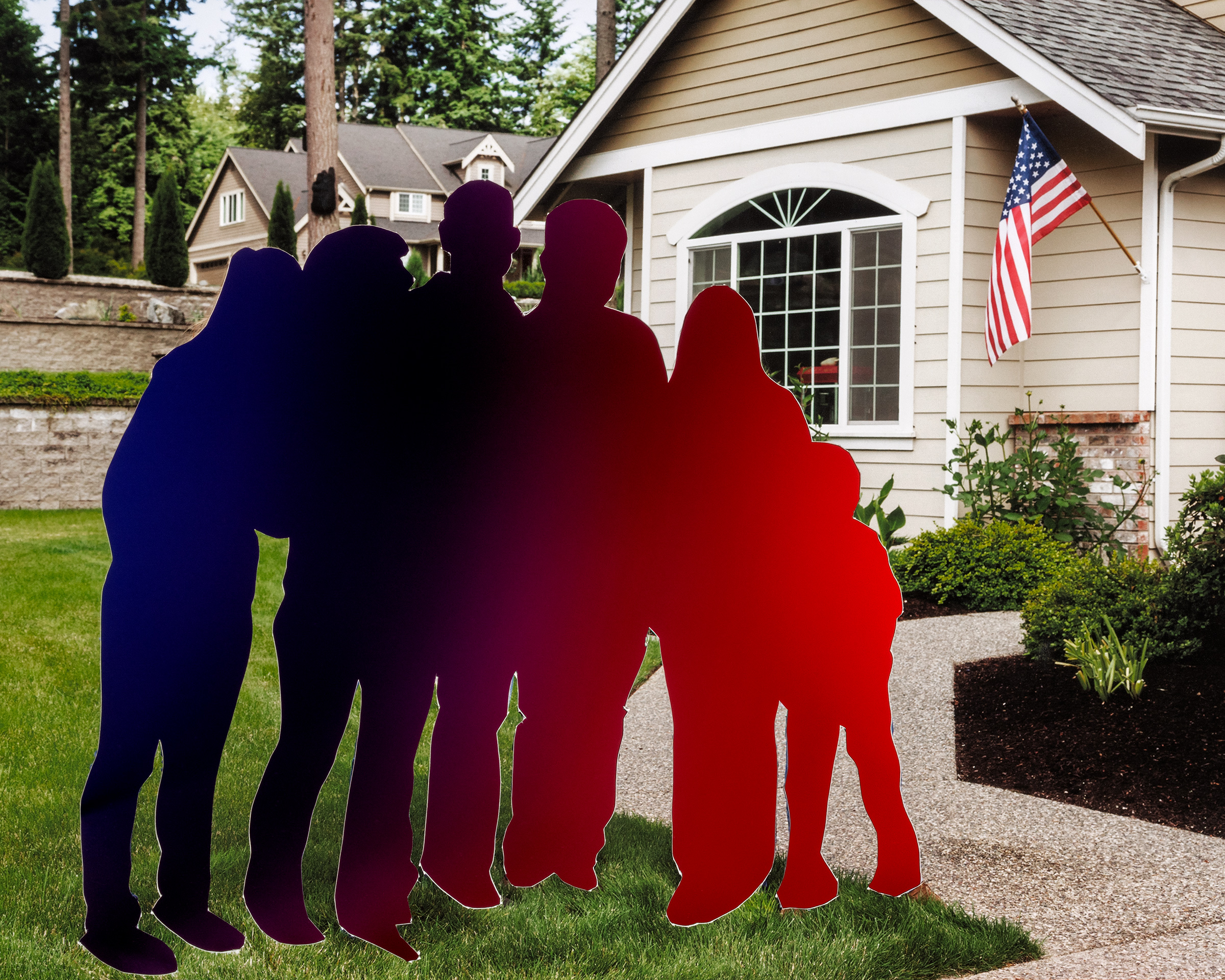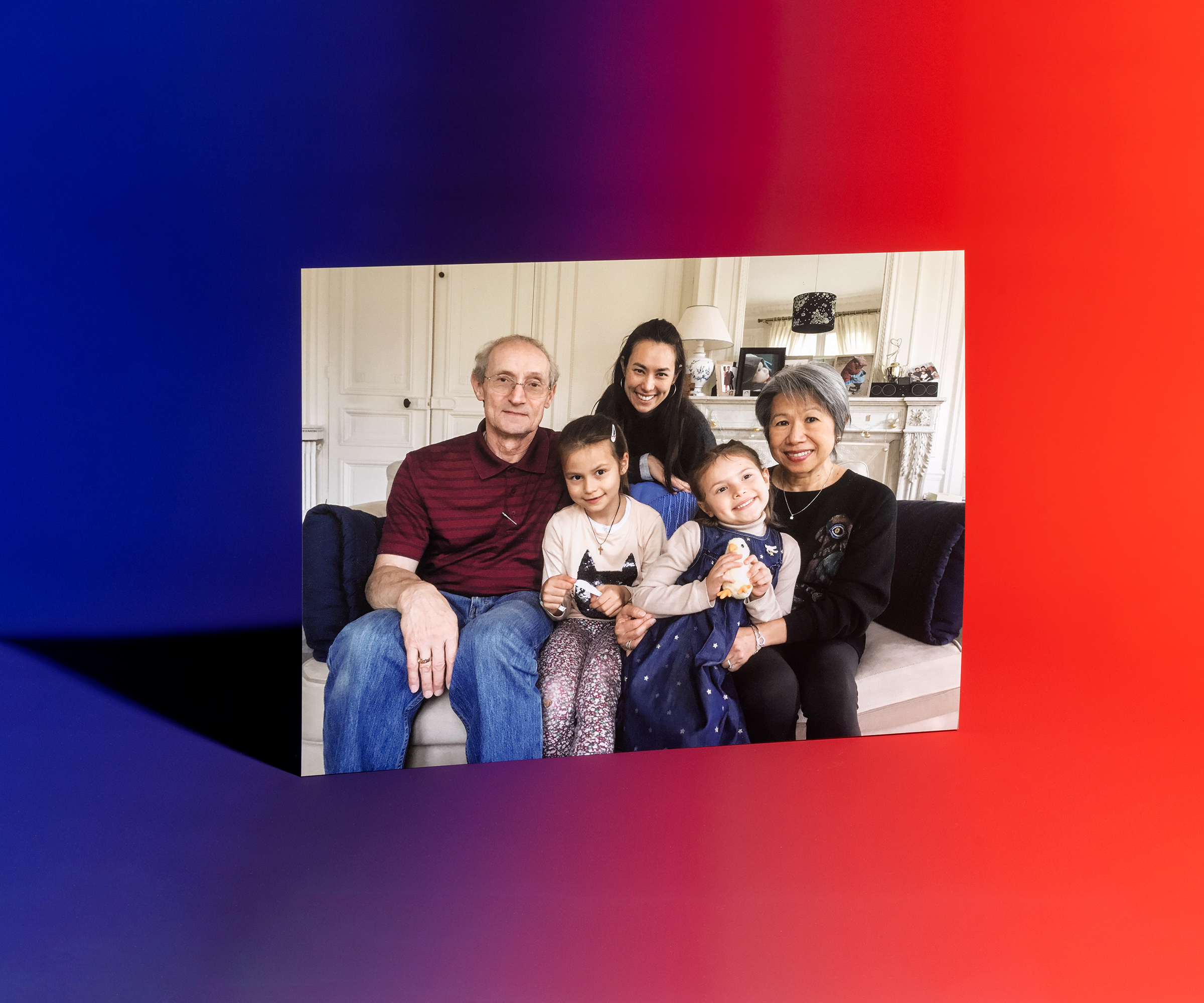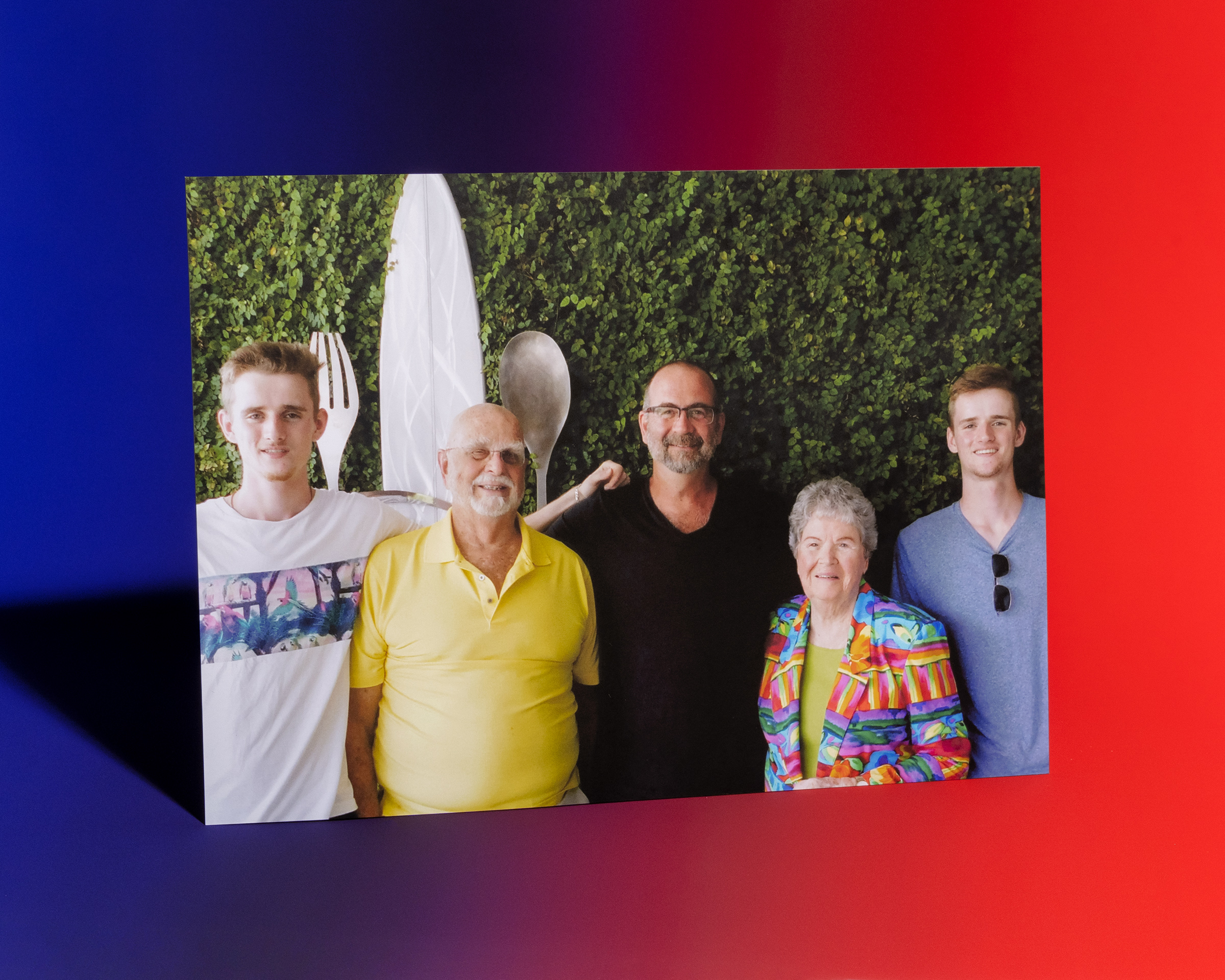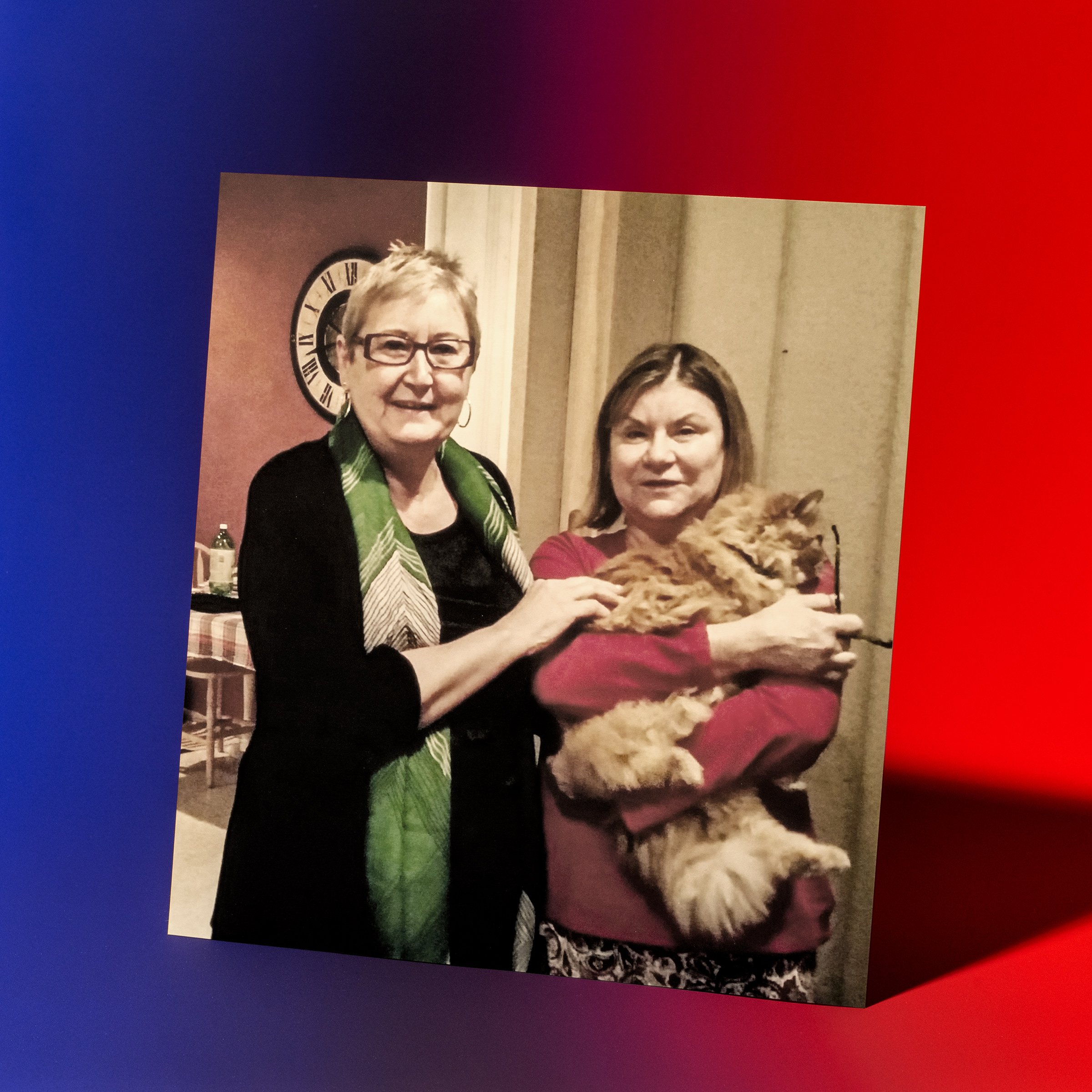
Stacey Pavesi Debré’s young daughters had a habit when they saw President Donald Trump on TV in their Paris apartment. They’d hold their noses and boo. That is, until Stacey’s mother Lonnie Pavesi came to visit for a week, to help take care of her grandchildren. After she left, the elder Debré child, who was about 7, had some strong words for her mother. “Mom, you lied to me,” she said. “You told me Trump was bad. Actually he’s not. Ama told me he’s making America better.”
It transpired that Lonnie had mixed in some political discourse with her grandmotherly duties. “She had brainwashed our daughters behind our back,” says the girls’ father, Guillaume Debré, with amusement. He’s a French journalist who has written a book on Trump, but he maintains that he does not have as intense feelings about him as his American wife. “I was like, This is getting out of hand. The mother and the grandmother are fighting for the soul of their granddaughter. This is crazy. Even the French people don’t do this.”
Disagreements about politics have been the specter of every family get-together since dinner was invented. But after one of the most divisive presidential administrations in U.S. history followed by an election the outgoing leader claims was fraudulent (without any evidence that has stood up in court) and an attack on the Capitol, those rifts are as wide as anyone can remember. A postelection Pew Research Center survey found that fewer than 2% of voters felt those who voted for the other party understood them very well, and only 13% of Joe Biden’s voters and 5% of Donald Trump’s voters expressed any desire for future unity.
President Biden won the election partly on the promise that he would heal the fissures between those who voted for him and those who voted for Trump. “Now it is time to turn the page,” he said in a speech after the Electoral College affirmed his victory. “To unite. To heal.”
For some families, that is going to be a very heavy lift.
An October study from the University of Missouri found that since 2016, family interactions have been more likely to drive highly partisan relatives apart than bring them together. One of the authors, associate professor of communication Ben Warner, says he had initially thought that having a family member who was on the opposite side of the aisle might lead to less stereotyping or dismissing of that person and their views. The study proved him wrong. “For people who are highly polarized, having a parent or child who is a member of the other party didn’t make things any better,” he says. “And it looked like it probably made things even worse, perhaps because it was such a point of tension in their family dynamic.”
So it is not surprising that most of the dozens of people TIME spoke to for this story didn’t want their names used. One woman said she has found it difficult to maintain communication with her Trump-loving twin sister; another said she has found herself trying to be the bridge between her African-American children and her white father. A mother of five began to feel increasingly isolated from her children and six siblings because of her support for Trump. One Black woman wept as she recalled helping her white mother register to vote for the first time, knowing she would vote to re-elect the then President.
Every parent spoke of how much they cherish their children, despite their differences. Most of the offspring, in turn, talked about how they believed their parents were good people. But a lot of people have quietly blocked family members on social media, or speak sadly of siblings or grandparents with whom they surreptitiously try to avoid spending time, and they worry that talking about it will further inflame the feud. Nevertheless, several families gamely tried to explain their differing points of view and how they were trying to navigate them.

In October, Gary and Mary Bliefnick of Missouri texted their son Soren and his sister Amy that they wanted to visit their children in early November instead of for Thanksgiving. They wondered if everyone could “commit to ignoring politics.” Soren texted back: “If you think Trump should be able to be re-elected, then we will have a problem regardless of the time of year.” His father asked what kind of problem. “I said, ‘A moral problem,’” says Soren. “And it just kind of went from there.”
Soren, who lives in Los Angeles, finds it incomprehensible that the same parents who taught him the importance of civility, politeness and decency could have supported President Trump. He is mystified as to why they couldn’t see the same homophobic and racist behavior and instincts that he saw, and why they didn’t recognize that a vote for Trump was a vote against justice. “They voted for him for a second term for vague reasons that are more important to them than undermining my rights,” he says. “It was so incredibly hurtful that they would do something like that and seem to be so either oblivious or indifferent.” And once his father became convinced the election was fraudulent, he wished “they could see what I see, because then they would know why it makes me sick with grief.”
His parents meanwhile are equally mystified as to why their son can’t let them vote for whom they want to vote for. “For me,” says Mary, “it was very hurtful that neither of our kids could appreciate our decision to make our own decision based upon the things that we thought were important,” which for her were largely around law and order. His father sees it simply as identity politics. “He basically thinks Trump is anti-gay,” says Gary Bliefnick, who says he didn’t vote in 2016 but liked what Trump had done with the economy and employment levels and in standing up to the media, and so cast his ballot for him in 2020. He has no problem with the fact his son is gay but feels the President represented no real threat to LGBTQ rights.
Experts say family political disagreements can chafe more than disagreements among friends or colleagues, because of how deeply humans identify with their family members, how much they feel they come from the same place. In 2016, Bill Doherty, a University of Minnesota social-science professor and family therapist, co-founded Braver Angels, an organization that runs workshops to help people of differing political views talk to one another. “The two biggest reasons people give for coming to the workshops are that they’re worried about polarization in the country,” he says, “and they’re worried about their families.” So many families approached the group for help in 2020 that it began offering online family political sessions, where volunteer moderators take people through a series of exercises to help them engage with family members who have strongly different political opinions. Doherty also added a lecture on political divisions to the postgraduate family-therapy courses he teaches.
Gary and Mary Bliefnick attribute their differences at least in part to geography. They feel their son changed when he went to college, and here Gary adjusts his tone slightly, in Boston. “I think my son and my daughter were—well, my choice of words would be warped—in the wrong direction about how awful America is,” he says. “They’re teaching them a different history than I learned.”
The Bliefnicks’ experience mirrors a 2018 study that showed that families in which the hosts and guests lived in different, highly partisan areas spent up to 50 minutes less over the 2016 Thanksgiving dinner than families who didn’t. The researchers estimated that this led to a cumulative loss of almost 34 million hours of family time.
Another issue making these schisms harder to deal with is that political preference is a more all-encompassing set of beliefs than it used to be, what academics call a “mega-identity.” If you are Republican, you don’t just believe in low taxes and robust defense spending. You’re more likely to be white, evangelical, and from a rural or small-town environment. And if you’re gay, African American or Latinx, and you live in a city, you’re more likely to vote Democratic. It’s not just about policy.
In many ways, the Pavesi clan embodies these identity differences. The senior Pavesis, who live in a small red outpost in Northern California, are devout Christians, and have been on mission and mercy trips all over the world. Stacey’s father Dave Pavesi was in the military. Stacey has spent most of her career in media and event planning, and the Debrés are more secular. Guillaume’s father is a French politician, and Guillaume was a correspondent for French TV in D.C. But for the elder Pavesis, politics takes a back seat to faith. “At the end of the day when everybody goes home, it doesn’t really change our life any,” says Dave. “I don’t believe either of us are persuaded by our individual arguments. That’s why I tend to avoid it more than not.”
Stacey, for whom politics is more important, describes the situation differently. To her, it felt as if Trump’s election altered her parents’ behavior. “There’s sort of a bubbling over, this need to express themselves politically. It’s completely foreign to me,” she says. And she’s distressed by what she hears. Her father maintains that the election was stolen and that the attack on the Capitol was “a slight overreaction,” the result of frustration over “problems with the election which are being ignored rather than lawfully investigated.” When Stacey tried to dissuade her parents of that view, she says her mother announced she didn’t want to talk politics anymore.
This time-honored way of handling such issues—just not talking about it—is not a viable option, however, for many families, because people are apt to air their views on social media anyway and also because it puts distance between people who are used to discussing things openly. Dr. Paul Groen and his son, also called Paul, are both very serious about their Christian faith, and talk about it regularly, but find their beliefs lead them to different conclusions. The elder Groen, 84, who for half his 50-year career as a physician was founding hospitals in Africa and now spends his days visiting those in his retirement community who are isolated because of COVID-19 restrictions, declines to say whom he voted for in 2020, but says it’s not hard to guess because he believes in small government. “I don’t condone a lot of his antics,” he says of the 45th President, “but I think a lot of things he’s done have been good.” He lays the blame for the current divisions more at the feet of Congress and its push to impeach the first time, and he doubts Biden will be able to offer much in the way of unity.
His son, an opera singer who lives in London, says he finds it hard to overlook Trump’s cuts to the number of refugees, disparagement of women, mishandling of the virus and use of “alternative facts.” For families like the Groens, the new landscape is difficult to navigate—it’s like they’re reading different maps. “I don’t know how to have a conversation with family when you can’t agree on facts,” says the younger Groen. Dr. Groen doesn’t really follow the news, while his son regards a grasp of current affairs as important. “As a Christian,” he continues, “what I find fundamentally disturbing is the abandonment of the idea that there is objective truth.”

The end of the Trump presidency doesn’t mean the end of the Trump era—or that the barriers between those who disagree with each other are dissolving. Despite the disputes, most of these families are still intact and finding ways to hang on to their relationships. There are many voters, however, for whom the bridges seem to be irrevocably burned. This is the group in which Lynette Villano has landed.
As recently as April 2016, Villano’s older sister, Susan Paraventi, took her and three relatives on a girls’ trip to the Florida Keys for Villano’s 70th birthday. Several years earlier, Paraventi had rushed to her sister’s side to help when Villano’s son had a medical procedure. Now the sisters never speak. Villano, from eastern Pennsylvania, is also estranged from two of her children. She says she was invited to Thanksgiving in 2018 and then uninvited when other family members protested.
Villano has always been a political enthusiast and a Republican, both traits she shared with her now deceased mother. When she ran to be the local delegate, she says, the rest of her family cheered her along. But things shifted, some of her family say, as soon as Trump came down the escalator at Trump Tower in 2015 and announced his candidacy. “It’s just all Trump all the time with her,” says Paraventi, who lives in Massachusetts. Villano’s social media fervor—her constant celebration of Trump’s behavior, family, opinions and denigration of his enemies—rankled other relatives, who felt she was hyping him to advance her own political career.
At one point, she shared selected texts from family members with a reporter, who put them in a book in a chapter titled “Trump’s Biggest Fan.” These missives, which her relatives say were edited to make them look bad and were used without permission, led to their receiving threatening messages. (They requested that TIME not use their names, citing safety concerns.) But Villano says she has also suffered. “I don’t think people realize how much hatred Trump supporters get,” she says.
For a while, Paraventi blocked her sister on social media but kept talking to her. Things reached a low just before Christmas 2019, when Villano, a two-time cancer survivor, was in New York City for medical reasons and Paraventi was there for a Bob Dylan concert (she has been to Dylan concerts in 48 states and several countries). The sisters planned a museum trip together. Their stories differ in some details, but they agree that just before meeting, Paraventi asked Villano to remove the large Trump flag pin she always wore, and in return she would wear no political regalia. Villano, who considers the pin her signature, declined. The excursion was called off. Paraventi’s husband went to his sister-in-law and tried to coax the two together, to no avail. “My mother is rolling in her grave,” says Paraventi. “The one thing she always said was that she just wanted her children to get along. We were a very close family.”
As far as Villano is concerned, her relatives are the ones being unreasonable. “If I was a good mother, sister and aunt all these years, and they loved me, what changed?” she asks. “Nothing changed about me. This is who I am. I support a candidate because of where they stand on the issues.” Her sister disagrees. She has other Trump-supporting relatives, but they don’t talk about it so much, or choose to promote the President if it has a negative effect on the rest of the family. “I think it changed her,” says Paraventi. “And the way she supported him changed my feelings toward her. I can’t see how she doesn’t understand some of the harm he’s done to this country.”

In some ways, disagreements within families have surfaced for the same reasons they have rumbled across the U.S. and even the planet. Trump is a divisive figure. Different generations have different values. People tend to take on the culture of the region they live and work in. The decline of trust in such institutions as the media, the church and the courts has left the two sides with no agreed-upon set of premises from which to start. Social media encourages people to live in an echo chamber and keeps amplifying views that could once be kept quiet for the sake of harmony. The pandemic has widened the chasm, since people don’t get to do things together. (One woman remarked that if she saw her estranged cousin, she’s pretty sure the muscle memory would lead her to hug her.) And, perhaps with fewer blockbusters, sports games and social events to discuss, and an unfiltered leader tweeting regularly until recently, politics has become the most tempting source of conversational fodder.
But even more than that, in the Trump era, many Americans don’t see voting as a decision about a set of policies, they see it as a moral imperative, an act that will make or break the country, in a way a vote for George W. Bush or Bill Clinton wasn’t. Villano, Gary Bliefnick and Dave Pavesi are steadfastly persuaded that the country has been a victim of election fraud. (Dave Pavesi insists that Biden is a puppet, whose controllers will soon be revealed.) Their left-leaning relatives are just as certain that their family members are on the wrong side of history. “My parents professed to love America and the Constitution and all of these things, and it’s like they’re trying to directly undermine that,” says Soren Bliefnick.
The Groens as well as the Pavesis and Debrés are in different countries; their interactions are mostly virtual and thus more tightly controlled. The Groens Zoom every week for at least an hour. “I would say we have good rapport, but I don’t know what [my son] would say because we probably will never agree politically,” says Dr. Groen. “For us it’s been hard to have a low-key discussion; they usually kind of get pretty energetic.” Some of the more difficult conversations are hashed out among the Pavesi clan over text. Dave Pavesi says Trump’s departure probably won’t change his family dynamic, which he doesn’t think is that bad. He’d like the election to be investigated but says, “I’m not going to let that hurt my family.” Villano is not sure she can ever reconcile with her sister or other relatives. Paraventi says she has stopped missing her: “I don’t know that things will get better anytime soon because she will never admit that anything she has done was over the top.” Soren Bliefnick says he thought about cutting his parents out of his life but decided against it, partly because his mother pointed out that she’d never do that to him. “As of right now, I feel separated from them more than
I have because of this,” he says. “It’s hard to want to talk to them with that sort of shadow hanging over me.” His mother Mary, “sick of the entire mess,” is not confident the election was fair, but was disgusted by Trump’s behavior after November when he should have been focused on COVID-19. “I just refuse to let my family be broken by politics,” she says.
Doherty, the family therapist, hopes that this relational fracturing shall pass. “People underestimate the tremendous pain and hurt involved in a family cutoff,” he says. “We all need time-out sometimes from family intensity, but that’s a whole different thing.” In an era dominated by a highly infectious disease, even a temporary break in communications, he notes, could be final: “Somebody gets COVID—what, you don’t call?”
Villano heard over Christmas that one of her relatives was ill. She texted a get-well message. She hasn’t heard back.
“I don’t think they want anything to do with me,” she says. “The theme of Joe Biden’s Inauguration is supposed to be unity, but I don’t see anything taking place from him or Congress that is going to unify the country. I don’t see anybody working to try and bring us together on either side. How are we ever going to get together to solve all the problems that we have?”
More Must-Reads From TIME
- The 100 Most Influential People of 2024
- Coco Gauff Is Playing for Herself Now
- Scenes From Pro-Palestinian Encampments Across U.S. Universities
- 6 Compliments That Land Every Time
- If You're Dating Right Now , You're Brave: Column
- The AI That Could Heal a Divided Internet
- Fallout Is a Brilliant Model for the Future of Video Game Adaptations
- Want Weekly Recs on What to Watch, Read, and More? Sign Up for Worth Your Time
Contact us at letters@time.com